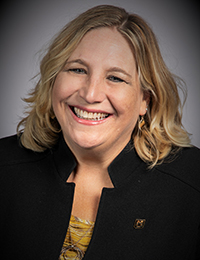Letter from the Chair:
 Welcome to the Department of Human Development and Family Science (HDFS) at the University of Missouri! Mizzou is a comprehensive research-intensive land-grant university and the first public university established west of the Mississippi River. We are proud of the long and storied traditions at Mizzou and our department is a strong entity within the university and the College of Education and Human Development.
Welcome to the Department of Human Development and Family Science (HDFS) at the University of Missouri! Mizzou is a comprehensive research-intensive land-grant university and the first public university established west of the Mississippi River. We are proud of the long and storied traditions at Mizzou and our department is a strong entity within the university and the College of Education and Human Development.
Human Development & Family Science is the science of being human. We learn and develop throughout the lifespan, and we do so through interactions with family members, teachers, schools, peers, social media, and romantic partners. The recognition of this lifetime of growth embedded in social interactions is what defines HDFS as a field, and what drives our faculty and students to better understand human development and family functioning.
Educate. HDFS offers undergraduate and graduate students hands-on training in research, teaching, and service. We offer several undergraduate and graduate degree options, both on campus and online, that can lead to careers in research, college or university teaching, industry, government agencies, or to administrative positions in public and private institutions. At the graduate level, students can enhance their service careers in youth development, community and family services, and gerontology by earning a Master’s degree completely online or advance their resume and skillset by completing one of our online graduate certificates. Our research-intensive on-campus PhD program consistently graduates faculty members to positions at Doctoral/Research Extensive Universities across the country. We are extremely proud of our alumni and invite you to join our list.
At the undergraduate level, HDFS at Mizzou trains students for careers in Child Life, Families, and Lifespan Development. Students focusing on young children are provided with a strong foundation in child development and opportunities to train directly with children in preschool settings, such as our Child Development Laboratory School. Students who live at a distance and want to focus on caring for and educating young children can earn an undergraduate degree online. The HDFS undergraduate degree offers students the knowledge and training to work in a variety of settings while providing services to improve the lives of children, adults, and families. We have undergraduate child life specialist alumni working with children in hospitals and other healthcare settings; we have families and lifespan development alums working in nonprofit community organizations and working with young children in a variety of educational settings.
For all of these programs, our goal is to improve the lives of individuals and families. We do so by training the next generation of professionals and scholars. We have alumni working in every county of the state and across the nation. HDFS faculty, staff, and myself work to inspire continued academic excellence through recruitment, mentoring, and encouragement of all students — and pledge to promote and support the college and university’s core values of Respect, Responsibility, Discovery, Excellence, and Engagement.
Research. At Mizzou, HDFS produces around $4 million dollars annually in research grant expenditures. Faculty in HDFS at MU conduct basic and applied research with a commitment to understanding family functioning, interpersonal relationships, and lifespan human development across a variety of contexts.
Engagement. Consistent with the mission of a land-grant university and specifically the College of Education & Human Development, our research and teaching are put into practice in many ways, including at our Center for Family Policy and Research (CFPR), which offers faculty and students opportunities to work on grant-funded research and intervention projects that directly serve children, families, and communities in Missouri. The CFPR has an outstanding history of translating research to practice and we are working to strengthen those relationships across the state and beyond. Our students excel in outstanding internships, both here in Columbia and across the state and nation. We also engage with citizens across the state through 4-H programming and Family Extension.
These are some of the highlights of the accomplishments and features that make our department an excellent choice. We invite you to contact us directly with questions and explore our website to learn more about our faculty, students, and programs. We are confident that our department and Mizzou will confirm your expectations of high quality undergraduate and graduate education and training.
Stay well,
Brenda Lohman
Department Chair and Professor
HDFS